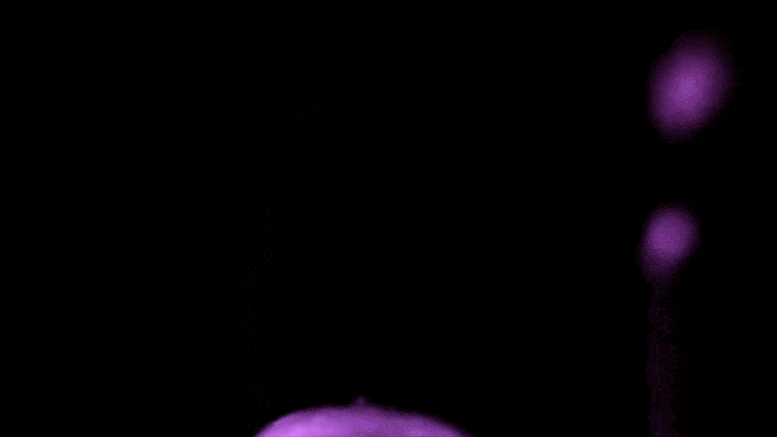
A flashing squid being pursued by a diving elephant seal. This movie was filmed during a study by another group of scientists published in Journal of Experimental Biology, where elephant seals were fitted with a camera to investigate diet. It is the only known example of this defensive behavior. Credit: Akinori Takahashi, The Graduate University for Advanced Studies, Japan. Reproduced with permission of The Company of Biologists. Yoshino, K. et al. (2020).
Southern elephant seal mothers have only one thing on their mind after weeks marooned on beaches nursing their pups: getting back into the ocean to feast on lantern fish and squid. Yet, no one was sure how the ravenous predators locate victims in the inky depths.
Pauline Goulet from the University of St Andrews, UK, and PI Mark Johnson suspected that the eerie bioluminescent glow produced by many creatures in the deep ocean might have something to do with it.
“Bioluminescent organisms are the main source of light (80%) in waters deeper than 500 m,” says Goulet. These animals produce two forms of light — a continual dim glow for camouflage from beneath and dazzling flashes, possibly to distract predators — and the duo wondered whether ravenous seals might capitalize on the creatures revealing themselves. Or, could the feisty prey buy themselves time by dazzling their attackers to make a getaway?
Curious to know how these games of cat and mouse play out beneath the waves Goulet, Christophe Guinet from the Centre d’Etudes Biologiques de Chizé, France, and Johnson decided to catch elephant seals in the act while pursuing their pyrotechnic victims. They publish their discovery that bioluminescent squid and fish flash at predatory elephant seals when under threat to disorientate the attacker to buy precious time to escape. The researchers publish their discovery in Journal of Experimental Biology.
First, Goulet and Johnson assembled a tag that could log the seals’ movements as they hunted, in addition to recording flashes of light when the mammals encountered bioluminescent snacks. “Because the bioluminescent flashes are so short, typically less than a second, the tags required a very fast light sensor,” Goulet explains. Then, Guinet traveled to the Kerguelen Islands in the Southern Ocean to attach the new tags and GPS trackers to five elephant seal mothers, with the help of Julie Mestre and Hassen Hallegue.
“There is always one person on watch for other seals when you are equipping them, because you are completely focused on what you are doing and unaware of an aggressive individual coming to bite you,” he recalls. In addition, Johnson joined Guinet and Julieta and Claudio Campagna in Argentina to tag two more seals.
Retrieving four tags when the seals returned 2 months later, the team could see that most of the animals had headed off on a 3000 km odyssey deep into regions of the ocean packed with fish. However, one intrepid Argentinian seal circumnavigated Cape Horn, eventually traveling 2300 km before locating fish off the coast of Chile. Then, after months of scrutinizing the seals’ maneuvers while painstakingly analyzing more than 2000 bioluminscent flashes over depths ranging from 79 to 719 m, Goulet and Johnson realized that the flashing animals were trying to scare off their attackers.
“The prey always emits a flash the second the seal launches an attack, which suggests that the flash is a defensive reaction when the prey realizes it is being attacked,” says Goulet. In addition, the seals quickly snapped up fish that failed to light up while they had a harder time capturing dinner when their snack dazzled them unexpectedly. However, one seal seemed to have turned the tables on its daring diet by tricking its victims into giving themselves away with a subtle twitch of the head that triggered a revealing flash.
It seems that bioluminescent fish fight back by attempting to startle their elephant seal pursuers, but their attackers can also learn to exploit their prey’s bioluminescent betrayal. Goulet and Johnson also hope to identify which species are on the seal’s menu from the animals’ distinctive flashes when they next return to the Southern Ocean.
Reference: “Flash and grab: deep-diving southern elephant seals trigger anti-predator flashes in bioluminescent prey” by Goulet, P., Guinet, C., Campagna, C., Campagna, J., Tyack, P. L. and Johnson, M., 20 May 2020, Journal of Experimental Biology.
DOI: 10.1242/jeb.222810
"dazzling" - Google News
May 20, 2020 at 05:00AM
https://ift.tt/3cNpeMb
Bioluminescent Squid and Fish Fight Back by Dazzling Attacking Elephant Seals - SciTechDaily
"dazzling" - Google News
https://ift.tt/2SitLND
Shoes Man Tutorial
Pos News Update
Meme Update
Korean Entertainment News
Japan News Update
Bagikan Berita Ini















0 Response to "Bioluminescent Squid and Fish Fight Back by Dazzling Attacking Elephant Seals - SciTechDaily"
Post a Comment